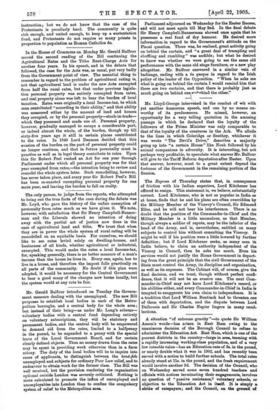In the House or Commons on Monday Mr. Gerald Balfour
moved the second reading of the Bill continuing the Agricultural Rates and the Tithe Rent-Charge Acts for another four years. In his speech, and in the debate that followed, the case for the Acts was, as usual, put very badly from the Government point of view. The essential thing to remember in regard to the problem of agricultural rating is, not that agricultural land is under the new Acts exempted from half the rural rates, but that under previous legisla- tion personal property was entirely exempted from rates, and real property alone was left to bear the burden of local taxation. Rates were originally a local Income-tax, to which men contributed "according to their ability," and that ability was measured either by the amount of land and houses they occupied, or by the personal property—stock-in-trade- which they possessed and made use of. Personal property, however, gradually managed to escape a considerable part, or indeed almost the whole, of the burden, though up till sixty-five years ago it still in certain places contributed to the rates. In 1840 Lord Denman decided that this evasion of the burden on the part of personal property could no longer continue, and that in future personalty must in practice as well as in legal theory contribute to rates. Upon this Sir Robert Peel rushed an Act for one year through Parliament under which all personal property was for that year exempted from rates,—the intention being to review and remodel the whole system later. Such remodelling, however, has never taken place, and every year Sir Robert Peel's Bill has been re-enacted exempting personal property for one more year, and leaving the burden to fall on realty.


































 Previous page
Previous page